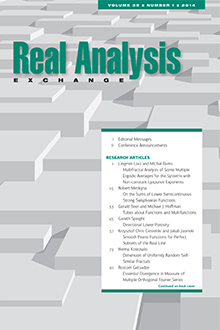Abstract
Let \(\{\epsilon_n\}\) be a sequence of positive numbers converging to \(0\). For each \(n\) divide the unit interval \([0, 1]\) into sub-intervals of the type \([k \epsilon_n, (k+1) \epsilon_n)\), \(k = 0, 1, 2, \dots\) and define a function \(f^n\) as \(1, -1, 1, -1, \dots\) successively on these intervals. If \(\{f^{n_k}\}\) is any subsequence of \(\{f^n\}\) then the set of points at which \(\{f^{n_k}\}\) converges has Lebesgue measure zero. This is a generalization of the well known analogous result for Rademacher functions.
Citation
Kali P. Rath. "The nonconvergence of a class of measurable functions." Real Anal. Exchange 21 (1) 304 - 307, 1995/1996.
Information





